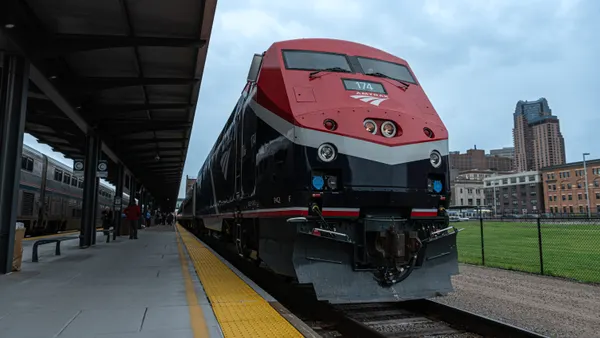Dive Brief:
- Kansas City, MO is a step closer to eliminating transit fares, following the city council unanimously approving a transit priority policy ordinance. It contains a provision instructing the city manager to include a funding request in the next fiscal year budget to make fixed-route public transportation free within the city.
- The city manager must report on the fiscal impacts the free transit funding request would pose on existing city services, contracts and programs. The city manager also works with partners to develop policies to guide transit priority on city streets to improve safety and transit capacity, efficiency and reliability.
- The move stands to make Kansas City the first major U.S. city to adopt zero-fare transit. However, other major cities like Columbia, SC are studying fare-free transit as well. It all depends on whose program officially gets off the ground first, Art Guzzetti, vice president of policy for the American Public Transportation Association (APTA), told Smart Cities Dive.
Dive Insight:
Kansas City's light rail already is free, but the ordinance would make bus trips free as well. The transit agency added a new bus rapid transit line this week, which will be free through February. It will eventually be among the city's permanently free transit options when the zero-fare program takes effect.
Although numerous major U.S. cities are looking into the possibility of going fare free, such programs have existed for decades in various forms throughout the country. Resort cities in Colorado are among those that run free buses seasonally to improve visitor safety during ski season. Retirement communities and universities frequently run a free bus or shuttle service. Cities of all sizes have implemented limited free service on certain transit routes, such as those in downtown areas.
Many transit agencies provide reduced or free fares to certain vulnerable portions of the population, such as seniors and low-income citizens. Pennsylvania offers free transit rides to seniors. This year alone, Los Angeles and Sacramento were among the cities announcing free transit rides for students. And Washington, DC just launched a pilot program offering free or discounted transit cards to 1,000 low-income citizens.
Some major cities — including Denver and Trenton, NJ — have tested free fares across their entire transit systems during pilot programs. Thus far, rural communities or small cities are the only U.S. communities to implement a permanent zero-fare transit programs. Missoula, MT's transit system is one example.
"There's no way to move people efficiently and make the economy healthy, attractive and vibrant without transit," Guzzetti said. "We need to make our transit systems attractive and used and useful. Some cities say [free transit] is a way to do that."
He explained that there are four key reasons transit agencies tend to adopt zero-fare strategies: to boost equity, the cost of fare collection exceeds revenue gained, to boost ridership and to alleviate transit employees' enforcement responsibilities.
Equity is the primary driver in Kansas City, other U.S. cities and global cities, Guzzetti said. The concept of mobility as a right is growing and "it's viewed as a social equalizer," he said. Providing free transit fares eliminates the financial barriers of people traveling to school, work, job interviews and chores such as grocery shopping.
Figuring out sustainable funding for zero-fare transit is a main holdback for cities. Transit system funding comes from a variety of sources — federal, state and local governments as well as transit fares — and losing one part of the equation requires agencies to lean more heavily on other sources. The funding model and feasibility of eliminating fares varies by agency.
"It's really a local decision," Guzzetti said. "We're hearing from a lot of transit systems across the country who [are] at least talking about [going zero-fare]. But it will be up to them whether they do it."












